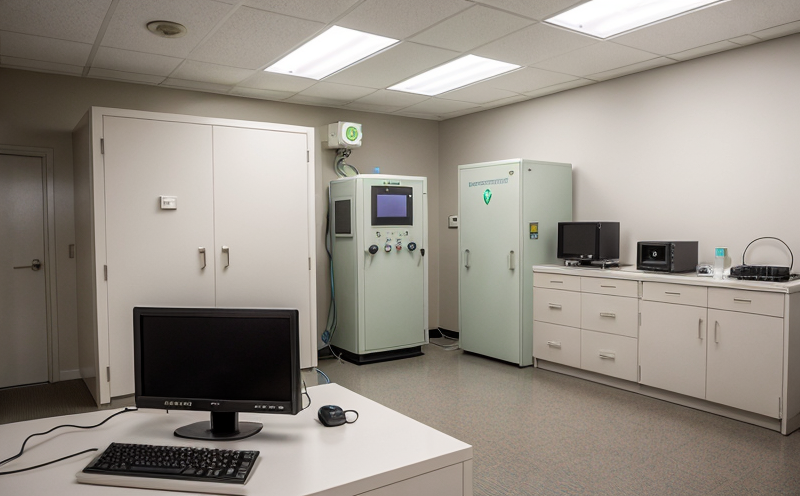Radiation Dosimetry & Monitoring
In the realm of radiation and nuclear testing, radiation dosimetry involves measuring, recording, and analyzing the absorbed dose of ionizing radiation. This critical process is essential for ensuring safety in environments where high levels of radiation are present, such as nuclear power plants, research facilities, and medical settings involving radiotherapy or imaging.
The primary purpose of dosimetry is to determine how much radiation an individual has been exposed to over a given period. This information is vital for regulatory compliance, occupational safety, and health monitoring. Accurate dose measurement also supports the optimization of radiation processes in various industries, such as healthcare and nuclear energy.
There are several types of dosimeters used in different applications:
- Film badges: These are worn by individuals to measure cumulative exposure over time.
- Electronic dosimeters: Portable devices that provide real-time radiation dose rate information.
- Thermoluminescent dosimeters (TLDs): Used in fixed positions or for personal monitoring, they store energy absorbed by certain crystals and release it when heated.
- Optical stimulated luminescence (OSL) dosimeters: A newer technology that uses a similar principle to TLDs but with different materials.
- Bioassay dosimetry: This involves measuring the concentration of radioactive material in biological samples, such as urine or blood.
The accuracy and reliability of radiation dosimetry are paramount. Standards like ISO 8529-1 for film badges and IEC 62387 for electronic dosimeters provide guidelines to ensure consistency and comparability across different systems. Compliance with these standards is crucial for maintaining accurate records and ensuring that the data can be trusted by regulatory bodies.
For R&D engineers, understanding radiation dosimetry allows them to design safer equipment and processes. In procurement, selecting high-quality dosimeters ensures that critical measurements are reliable. Quality managers rely on this data to ensure compliance with safety regulations. The importance of accurate dosimetry cannot be overstated; it is a cornerstone of radiation protection in all sectors.
Why It Matters
Radiation exposure, even at low levels, can have significant health implications. According to the International Commission on Radiological Protection (ICRP), there is no threshold below which radiation exposure has no harmful effects. Therefore, precise dosimetry is essential for minimizing risks and ensuring compliance with regulatory limits.
In healthcare settings, accurate dosimetry allows medical professionals to optimize treatments, reducing unnecessary radiation doses while maintaining efficacy. In nuclear facilities, it ensures that workers are not exposed to levels of radiation exceeding safe limits set by organizations like the International Atomic Energy Agency (IAEA).
The importance of radiation dosimetry extends beyond safety and compliance. It also plays a role in optimizing processes where radiation is used as an energy source or for diagnostic purposes. By accurately measuring doses, industries can ensure that they are using resources efficiently while keeping exposure levels to workers at the lowest possible level.
- Healthcare: Minimizes patient and staff exposure during medical procedures.
- Nuclear Power: Ensures worker safety in high-risk environments.
- Aerospace: Protects astronauts and equipment from cosmic radiation.
- Radiopharmaceutical Manufacturing: Guarantees consistent product quality and patient safety.
The benefits of accurate dosimetry are clear: safer work environments, better health outcomes for patients, and more efficient use of resources. Compliance with international standards not only ensures that these goals are met but also builds trust in the systems used by regulatory bodies.
Why Choose This Test
Selecting a reliable radiation dosimetry service is crucial for ensuring accurate measurements and compliance with regulations. Here’s why you should choose this test:
- Accurate Results: Our laboratory uses state-of-the-art equipment and adheres to international standards, guaranteeing precise results.
- Compliance Assurance: We ensure that all tests meet the requirements of relevant regulations and industry standards.
- Expertise: Our team consists of experienced professionals with extensive knowledge in radiation dosimetry.
- Rapid Turnaround Times: We understand the importance of timely results, offering quick turnaround times for your dosimetry needs.
- Custom Solutions: Whether you need a one-time test or ongoing monitoring, we provide tailored solutions to meet your specific requirements.
- Comprehensive Reporting: Our detailed reports include all necessary data and analyses, providing you with the information you need for decision-making.
- Trustworthiness: We have a proven track record of delivering accurate and reliable results, ensuring that you can trust our services.
The choice of a reputable laboratory is crucial when it comes to radiation dosimetry. Our commitment to quality, accuracy, and compliance ensures that your tests are conducted with the utmost precision, providing you with the confidence you need for critical decisions in your industry.





